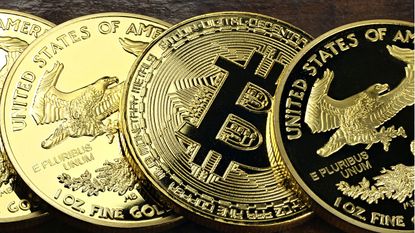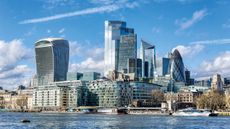Why all investors need to own gold – and bitcoin
Inflation, war, currency debasement – the world is changing fast and investors need to adapt. That means owning both gold and bitcoin, says Dominic Frisby.


I was lucky enough to find myself on GB News at the weekend, standing in for the veteran broadcaster Alastair Stewart, who was taking some no doubt well-deserved time off.
No prizes for guessing what subject was the main focus of the two two-hour programmes.
The world has changed, and investors need to take that into account
There were all sorts of guests – Russian, Ukrainian, Polish – who all knew their onions, and added so many profound insights into the conflict.
Subscribe to MoneyWeek
Subscribe to MoneyWeek today and get your first six magazine issues absolutely FREE

Sign up to Money Morning
Don't miss the latest investment and personal finances news, market analysis, plus money-saving tips with our free twice-daily newsletter
Don't miss the latest investment and personal finances news, market analysis, plus money-saving tips with our free twice-daily newsletter
I sat there trying to ask sensible questions while absorbing as much information as I possibly could. I can’t pretend to be informed on this subject, despite being a lot more so now than I was a week ago – like most of us, I guess.
We covered so many subjects. The incredible bravery of the Ukrainian people and the resilience they have shown in the face of much better-armed opponents; the apparent strategic mistakes made by Russian forces so far, and the poor communication; the ruthlessness of Putin, the need to win and the risk that he doubles down.
We also covered sanctions, Swift and the weaponisation of money; the war on the oligarchs and the kleptocrats; the imminent refugee crisis; propaganda; the tacit alliance between Russia and China – and that China will be watching all of this and learning; the ramifications for Taiwan; the dependency of so many nations on Ukraine and Russia for food supplies. And much more besides.
I watched, listened and tried to learn.
I left the studio with a distinct feeling of dread that this invasion may prove to be the beginning of something much bigger. Russian commentator Konstantin Kisin, who hosts the popular podcast Triggerpod, kept repeating the point that in terms of historic significance this invasion is “bigger than 9-11”. The geopolitical landscape has changed, he said, and the West is at war.
On both days, I left the studio feeling glad that I owned gold. It has been a source of immense disappointment and frustration to me, as regular readers will know, but there is a time to own gold and now would appear to be one of those times.
I have reported more times than I care to remember on the vast amounts both Russia and China have accumulated over the last 20 years.
Meanwhile, the way that the West has weaponised its money and banking against Russia is extraordinary – unprecedented even, and made possible by digital banking and modern technology.
China is surely looking at this weaponisation, looking at Taiwan, and thinking that to protect itself, it needs to de-dollarise as quickly and discreetly as possible. Indeed, we know China has already been doing that.
With so much money frozen abroad, one of the few ways in which Russia can actually fund itself is by selling its gold, probably via Dubai, so that may mean selling pressure. Even so, I think gold rises from here.
Hold gold, bitcoin and gold miners in the Americas
Inflation comes with war; money gets debased, no matter which side you are on. If there is some kind of China-Russia, anti-West alliance, then just as we have retaliated against Russia through Swift and the banking system, that alliance will do the same in reverse. Ergo, it will wage war on the dollar.
Western money is vulnerable. Fiat money has been printed into oblivion, while interest rates have been suppressed. Official inflation is already at 7%, while actual inflation is arguably much higher. Yet the system probably can’t take interest rates much above two or three percent. There is too much debt.
When the price of raw materials – commodities and natural resources – goes up even more because a key supplier, Russia, has been cut off, the pain of inflation is going to get worse.
Governments may well attempt to impose price controls, but history shows that any relief that comes from price controls is only temporary. For the most part they don’t work and often just lead to shortages.
I’ve said for many years all China has to do is declare what its gold holdings really are – and you can see last year’s estimates here (I will do an update on this soon) – and that will be tantamount to a declaration of war. My theory, remember, is that China’s gold holdings are as big, if not bigger than those of the US.
I know I have long moaned about gold. It’s the most analogue asset there is in a world where all the value is digital. But I have also said many times that I continue to own it. It may be analogue but it has also been money since forever. It’s the first metal we ever used.
We used it long before the Bronze Age, when we discovered smelting. Its purpose was the same as it is now – as reward, as display, as store of value, as tool of trade (in this case barter). In other words, as money.
But I have moaned about it because it has been such a perennial disappointment for so long.
The currency wars are hotting up. Attacks on national currencies are going to become the norm; the rouble has been bombed already. Don’t think that at some stage the dollar, euro and the pound are not going to come under attack, because they will. Other fiat currencies will get caught in the crossfire.
Gold and bitcoin are the places to hide.
On the subject of bitcoin, I see this conflict as an opportunity for it to decouple itself from the Nasdaq. If Swift is out of bounds, and governments in conflict have their tentacles running through the banking system, the use case for bitcoin suddenly got more compelling. What better way to transfer value across borders?
You want to own both. And all those gold miners located far away from all of this in the Americas. There’s going to be a lot more demand for their product.
Dominic’s film, Adam Smith: Father of the Fringe, about the unlikely influence of the father of economics on the greatest arts festival in the world is now available to watch on YouTube.
Dominic Frisby (“mercurially witty” – the Spectator) is the world’s only financial writer and comedian. He is MoneyWeek’s main commentator on gold, commodities, currencies and cryptocurrencies. He is the author of the books Bitcoin: the Future of Money? and Life After The State. He also co-wrote the documentary Four Horsemen, and presents the chat show, Stuff That Interests Me.
His show 2016 Let’s Talk About Tax was a huge hit at the Edinburgh Festival and Penguin Random House have since commissioned him to write a book on the subject – Daylight Robbery – the past, present and future of tax will be published later this year. His 2018 Edinburgh Festival show, Dominic Frisby's Financial Gameshow, won rave reviews. Dominic was educated at St Paul's School, Manchester University and the Webber-Douglas Academy Of Dramatic Art.
You can follow him on Twitter @dominicfrisby
-
-
 Investment trust discounts hit 2008 levels. Here’s how to profit
Investment trust discounts hit 2008 levels. Here’s how to profitInvestment trust discounts have risen to levels not seen since 2008, here are three trusts looking to buy to profit.
By Rupert Hargreaves Published
-
 A luxury stock to buy at a high street price
A luxury stock to buy at a high street priceInvestors wrongly consider Watches of Switzerland a high-street outlet.
By Dr Matthew Partridge Published
-
 Investing in wine: how Cru Wine is reaching new audiences
Investing in wine: how Cru Wine is reaching new audiencesTips Gregory Swartberg, founder of fine wine specialist Cru Wine, talks to Chris Carter about how to start a wine collection
By Chris Carter Published
-
 Small companies with big potential
Small companies with big potentialMichael Taylor of Shifting Shares reviews his 2023 picks and highlights more promising minnows.
By Michael Taylor Published
-
 The MoneyWeek portfolio of investment trusts – July 2023 update
The MoneyWeek portfolio of investment trusts – July 2023 updateTips A decade ago we set up the MoneyWeek portfolio of investment trusts. They remain a compelling long-term bet says Rupert Hargreaves
By Rupert Hargreaves Published
-
 Women lead the way with ethical investments
Women lead the way with ethical investmentsDemand for more ethical investments has soared – and women are more likely to opt for them. Annabelle Williams, personal finance specialist at Nutmeg, takes a look at why.
By Annabelle Williams Published
-
 BoE: Mortgage payments to rise by £220 a month for households
BoE: Mortgage payments to rise by £220 a month for householdsMillions of households can expect a mortgage spike of around £200 a month - and some may even reach a extra £1,000 a month, the Bank of England warns
By Marc Shoffman Published
-
 What happened to Thames Water?
What happened to Thames Water?Thames Water, the UK’s biggest water company could go under due to mismanagement and debt. We look into how the company got itself into this position, and what investors should expect.
By Simon Wilson Last updated
-
 Where to invest in the metals that will engineer the energy transition
Where to invest in the metals that will engineer the energy transitionA professional investor tells us where he’d put his money. This week: John Ciampaglia, manager of the Sprott Energy Transition Materials UCITS ETF.
By Nicole García Mérida Published
-
 How investors can profit from high food prices
How investors can profit from high food pricesThe latest furore over grocery prices will die down, says David Stevenson. But the long-term outlook for soft commodities remains bullish. These are the stocks investors can buy to profit from high food prices.
By David J Stevenson Published









